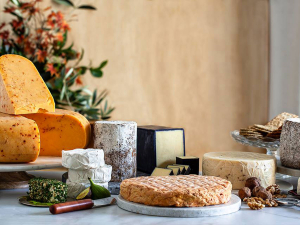Boutique cheesemaker Cranky Goat in voluntary liquidation
Award-winning boutique cheese company, Cranky Goat Ltd has gone into voluntary liquidation.
 The acquisition includes the property, plant and equipment of the Temuka site, along with the consumer cheese brand of Talbot Forest Cheese.
The acquisition includes the property, plant and equipment of the Temuka site, along with the consumer cheese brand of Talbot Forest Cheese.
Canterbury milk processor Synlait has taken over ownership of Talbot Forest Cheese.
The acquisition includes the property, plant and equipment of the Temuka site, along with the consumer cheese brand (Talbot Forest Cheese). The deal excludes Talbot Forest Cheese artisan factory in Geraldine.
In a statement Synlait says it assumes management and operational control of Talbot Forest Cheese as of today: Talbot Forest Cheese employees start with Synlait.
“We’re pleased to finalise this sale process and welcome Talbot Forest Cheese employees into the Synlait family”, says Leon Clement, Synlait chief executive.
“The acquisition enables us to manufacture a variety of cheese products. It also helps us optimise our manufacturing assets (especially during peak seasonal flows), access new profit pools, and align with our approach to run a high-quality, flexible dairy manufacturing plant that enables us to tailor product to meet customer needs.”
In June 2019 Synlait appointed Andrew Bull as general manager Talbot Forest Cheese.
Bull says he feels extremely privileged to be leading a legacy created by Paul Fitzsimons, founder of Talbot Forest Cheese, and his team.
“We have talented staff, world class assets and award winning cheeses that provide a strong foundation for growth in both the speciality and foodservice sectors.”
Bull says Synlait plans to produce around 5,000 tonnes of cheese during the 2019-20 season.
“Our highly automated plant is capable of manufacturing both dry and brine salted products, including parmesan, cheddar, gouda and mozzarella for both retail and foodservice customers. In addition, we have retained the ability to make open vat cheeses such as haloumi and feta, which are extremely popular.”
These products, along with ingredient cheeses made to customer specifications, will be sold to the local and international wholesale markets.
According to the latest Fresh Produce Trend Report from United Fresh, 2026 will be a year where fruit and vegetables are shaped by cost pressures, rapid digital adoption, and a renewed focus on wellbeing at home.
The Roar is a highlight of the game hunting calendar in New Zealand, with thousands of hunters set to head for the hills to hunt male stags during March and April.
OPINION: The past few weeks have been tough on farms across the North Island: floods and storms have caused damage and disruption to families and businesses.
European dairy giant Arla Foods celebrated its 25th anniversary as a cross-border, farmer-owned co-operative with a solid half-year result.
The sale of Fonterra’s global consumer and related businesses is expected to be completed within two months.
Fonterra is boosting its butter production capacity to meet growing demand.
OPINION: Fonterra may be on the verge of selling its consumer business in New Zealand, but the co-operative is not…
OPINION: What does the birth rate in China have to do with stock trading? Just ask a2 Milk Company.